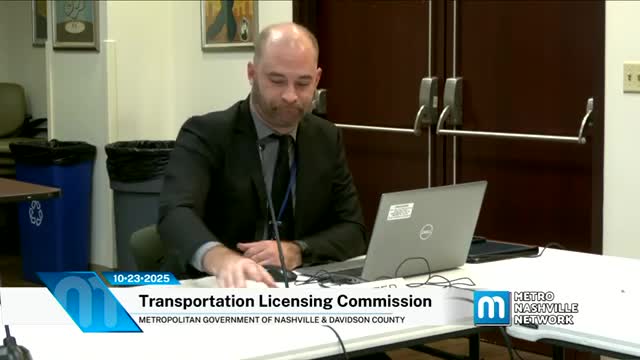SPIN pitches rider-score pilot and new e-bike/scooter models to MTLC to curb sidewalk riding and parking problems
Get AI-powered insights, summaries, and transcripts
Subscribe
Summary
SPIN presented a pilot of a rider-score system and new device models (including an e-bike and scooters with improved safety features) intended to reduce sidewalk riding and improper parking; the company proposed an AB-test pilot starting mid-November and a six-month evaluation period.
SPIN representatives on Tuesday demonstrated a new rider-score product and new device models to the Transportation Licensing Commission as part of an effort to reduce sidewalk riding, improper parking and other risky user behavior.
The company described a two-part pilot that would collect device telemetry and photo-evidence of parking, apply machine-learning analysis to create a per-user rider score, and test targeted interventions (warnings, disincentives or suspensions) on a randomized subset of users. SPIN proposed beginning data collection immediately and rolling out interventions in a 50/50 AB-test group by mid-November, with interim reporting to the Commission and a possible six-month pilot period to capture higher-season ridership data.
Why it matters: City officials and residents have repeatedly complained about sidewalk riding, wrong-way riding and poor parking practices. SPIN's telemetry-based rider scoring and photo-based parking verification are intended to give regulators and operators data to measure compliance and apply targeted corrective actions to repeat offenders.
What SPIN proposed and demonstrated - Rider score: An in-app metric that aggregates telemetry signals (tilt, sway, harsh braking, swerving), double-riding detection, and parking behavior. Company staff said the system can trigger real-time warnings after a trip and, for repeat low scores, deliver disincentives or account suspensions. - Parking verification: The end-of-trip workflow requires a user to upload a photo; SPIN said its AI photo review can classify proper parking at corrals, bike racks or in a specified furniture/landscape zone off the pedestrian clearway. - Sidewalk detection: Current telemetry models infer sidewalk vs. street rides with roughly 90-95% accuracy; SPIN said a later phase will add vision/camera-based detection and improved machine learning models. - Safe-start options: The app can require a rider to type an affirmation or complete a reaction-time test on-screen as an alcohol-related check. - New devices: SPIN showed a new scooter with battery in the baseboard and a larger front suspension, and a commuter e-bike model (lower step-through, throttle option) that the company plans to deploy in Nashville soon.
Questions from commissioners and staff Commissioners pressed on accuracy (sidewalk detection in areas with inconsistent sidewalks), how double-riding is measured and whether tourists, who take fewer rides while visiting, can be meaningfully impacted by the pilot. SPIN said the pilot will separate tourist and local patterns (using anonymized trip/credit-card indicators where available) and will target interventions after a user has taken at least two trips to establish a pattern.
Data sharing and oversight Commissioners asked for aggregate data to respond to constituent complaints; SPIN said it will work with NDOT and TLC staff on a data-sharing plan and will present interim findings about tourist vs. local rider profiles during the pilot.
Ending: Commission staff and SPIN agreed to continue technical coordination; SPIN offered to return with early pilot data and device deliveries for additional review.
